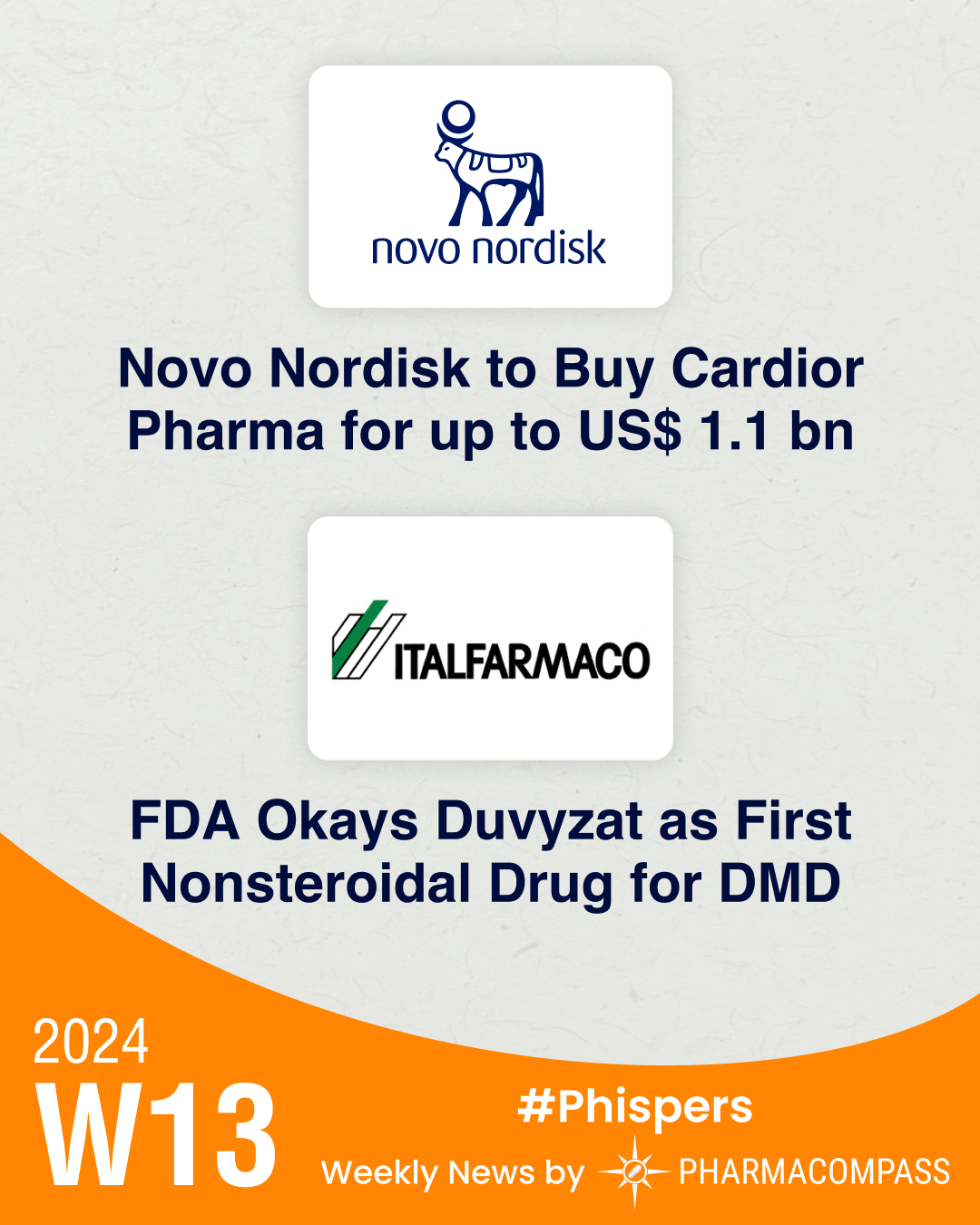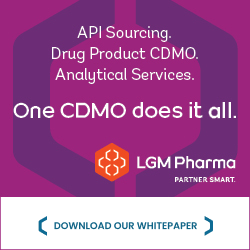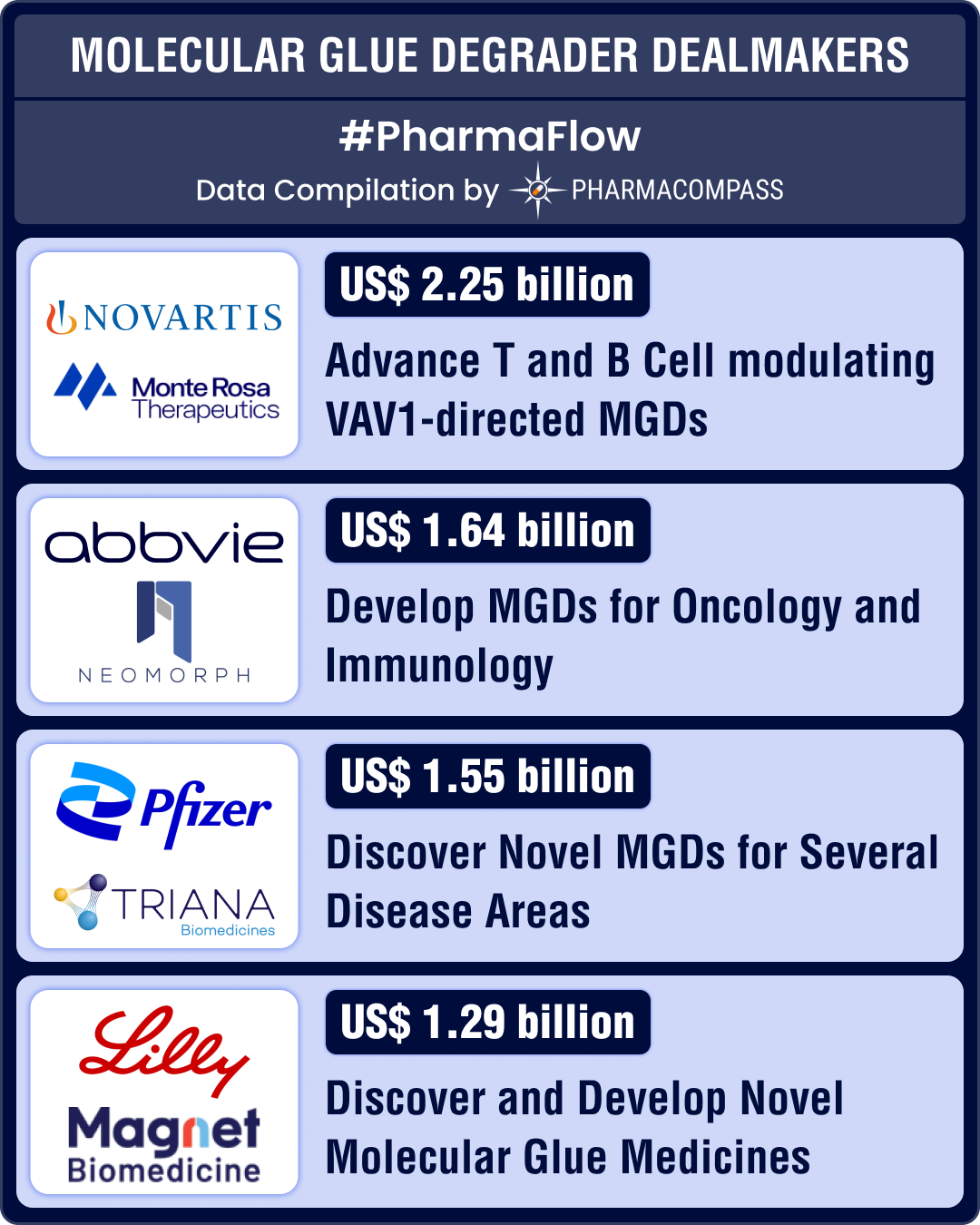
By PharmaCompass
2024-03-28
Impressions: 1,317 (Article) || 1 (Video)
This week’s Phispers has news on drug approvals, particularly meds to treat pulmonary arterial hypertension (PAH), Duchenne muscular dystrophy (DMD), and anemia caused by chronic kidney disease (CKD). The United States Food and Drug Administration (FDA) has approved Merck’s Winrevair and Johnson and Johnson’s combo tablet Opsynvi for treating adults with PAH. The agency has also okayed Italfarmaco’s Duvyzat for the treatment of DMD. And, after rejecting Akebia’s vadadustat in March 2022, the agency has okayed the drug to treat anemia caused by CKD.
In deals, Novo Nordisk has agreed to acquire Cardior Pharmaceuticals for up to US$ 1.1 billion in order to boost its cardiovascular diseases pipeline. Blackstone’s life sciences arm is offering Moderna a funding of US$ 750 million to bolster its efforts to develop flu vaccines. And, non-profit Caring Cross is collaborating with Fiocruz, a foundation set up by the Brazilian government, to develop local manufacturing of CAR-T cell and stem cell gene therapies in Brazil, thereby making them affordable.
In legal and regulatory updates, a federal judge in the US has given J&J a new chance to contest the scientific evidence linking its talc to cancer. And, FDA’s India office has said that inspectors from state drug control authorities from four Indian states are eligible to be included as observers for relevant inspections in their respective states.
Novo strengthens cardio pipeline through US$ 1.1 billion Cardior Pharma buyout
Novo Nordisk has agreed to buy Cardior Pharmaceuticals for up to € 1.03 billion (US$ 1.1 billion), thereby strengthening its drug pipeline for cardiovascular diseases. Cardior’s therapeutic approach targets distinctive non-coding RNAs as a platform for addressing root causes of cardiac dysfunctions with an aim to achieve lasting patient impact, the Danish drugmaker said.
Germany-based Cardior’s lead candidate CDR132L is designed to halt and partially reverse cellular pathology by selectively blocking abnormal levels of the microRNA molecule miR-132, potentially leading to long-lasting improvement in heart function. CDR132L is currently being investigated in a phase 2 trial in people with heart failure with reduced ejection fraction (HFrEF) who have previously suffered a heart attack (myocardial infarction).
Blackstone offers US$ 750 million funding to Moderna: Blackstone’s life sciences arm is offering funding of US$ 750 million to Moderna for funding its flu vaccines. This tranche of funding would bolster Moderna’s efforts to advance multiple vaccines and help lift its sagging fortunes due to the slump in post-Covid sales. The biotech firm is developing several new vaccines, including shots for cancer and respiratory syncytial virus (RSV), and plans to spend about US$ 4.5 billion on research and development in 2024.
Caring Cross, Brazil’s Fiocruz to produce affordable gene therapies: Non-profit Caring Cross is collaborating with Fundação Oswaldo Cruz (Fiocruz), a foundation from the Brazilian Ministry of Health, to develop local manufacturing of CAR-T cell and stem cell gene therapies in Brazil. Caring Cross has developed manufacturing processes that significantly decrease the material cost of making CAR-T cell therapy products. The initial phase of the program will focus on CAR-T cell therapies for leukemia and lymphoma.
FDA approves Merck’s Winrevair, J&J’s Opsynvi to treat rare lung disease
FDA has approved a breakthrough therapy from Merck that treats adults with hypertension that is caused by constriction of the arteries in the lungs, known as pulmonary arterial hypertension (PAH). Merck’s Winrevair (sotatercept-csrk) is the first FDA-approved activin-signaling inhibitor therapy for PAH. It is to be given once every three weeks as a subcutaneous injection. Merck had acquired the drug through its US$ 11.5 billion acquisition of Acceleron Pharma in 2021.
The agency has also approved Johnson & Johnson’s Opsynvi – a single-tablet combination of macitentan and tadalafil – for the chronic treatment of adults with PAH. With this approval, Opsynvi has become the only once-daily, single-tablet combination therapy for PAH.
After rejection in 2022, Akebia’s med bags FDA nod for treating anemia in CKD
FDA has approved Akebia’s anemia drug, vadadustat, to treat anemia caused by chronic kidney disease (CKD) in dialysis patients. The drug will be available under the brand name Vafseo. In March 2022, FDA had declined to approve vadadustat due to safety concerns as it posed an increased risk of blood clot formations and drug-induced injuries to the liver.
Italfarmaco’s Duvyzat approved for DMD: FDA has approved the oral medication Duvyzat (givinostat) for the treatment of Duchenne muscular dystrophy (DMD) in patients six years of age and older. Duvyzat is the first nonsteroidal drug approved to treat patients with all genetic variants of DMD, the most common hereditary neuromuscular disease. Over time, the muscles deteriorate causing problems with walking. Ultimately, DMD leads to problems with breathing, causing early death. Duvyzat is set to compete with Sarepta Therapeutics’ bestselling medicine Exondys 51, and Sarepta’s other therapies Vyondys and Amondys.
J&J gets fresh chance to contest evidence linking its talc to cancer
In the US, a federal judge has ruled that J&J will be given a new chance to contest the scientific evidence linking its talc to ovarian cancer. J&J has repeatedly denied claims that its baby powder and other talc products cause cancer or contain asbestos. The company is facing over 53,000 lawsuits over its talc products. J&J has welcomed the ruling as it said it intends to “shine a light on some of the made-for-court junk science” used in recent trials.
FDA allows Indian states to observe its drug inspections: Amid growing concerns over the quality of drugs coming out of India, FDA’s India office has said that inspectors from state drug control authorities from four Indian states are eligible to be included as observers for relevant inspections in their respective states. The four states include Gujarat, Telangana, Goa, and Karnataka, where there are high numbers of FDA-registered facilities. The US agency has shared best practices and inspectional protocols in regulatory forums with the Indian states.
The PharmaCompass Newsletter – Sign Up, Stay Ahead
Feedback, help us to improve. Click here
Image Credit : Phisper Infographic by PharmaCompass license under CC BY 2.0
“ The article is based on the information available in public and which the author believes to be true. The author is not disseminating any information, which the author believes or knows, is confidential or in conflict with the privacy of any person. The views expressed or information supplied through this article is mere opinion and observation of the author. The author does not intend to defame, insult or, cause loss or damage to anyone, in any manner, through this article.”








